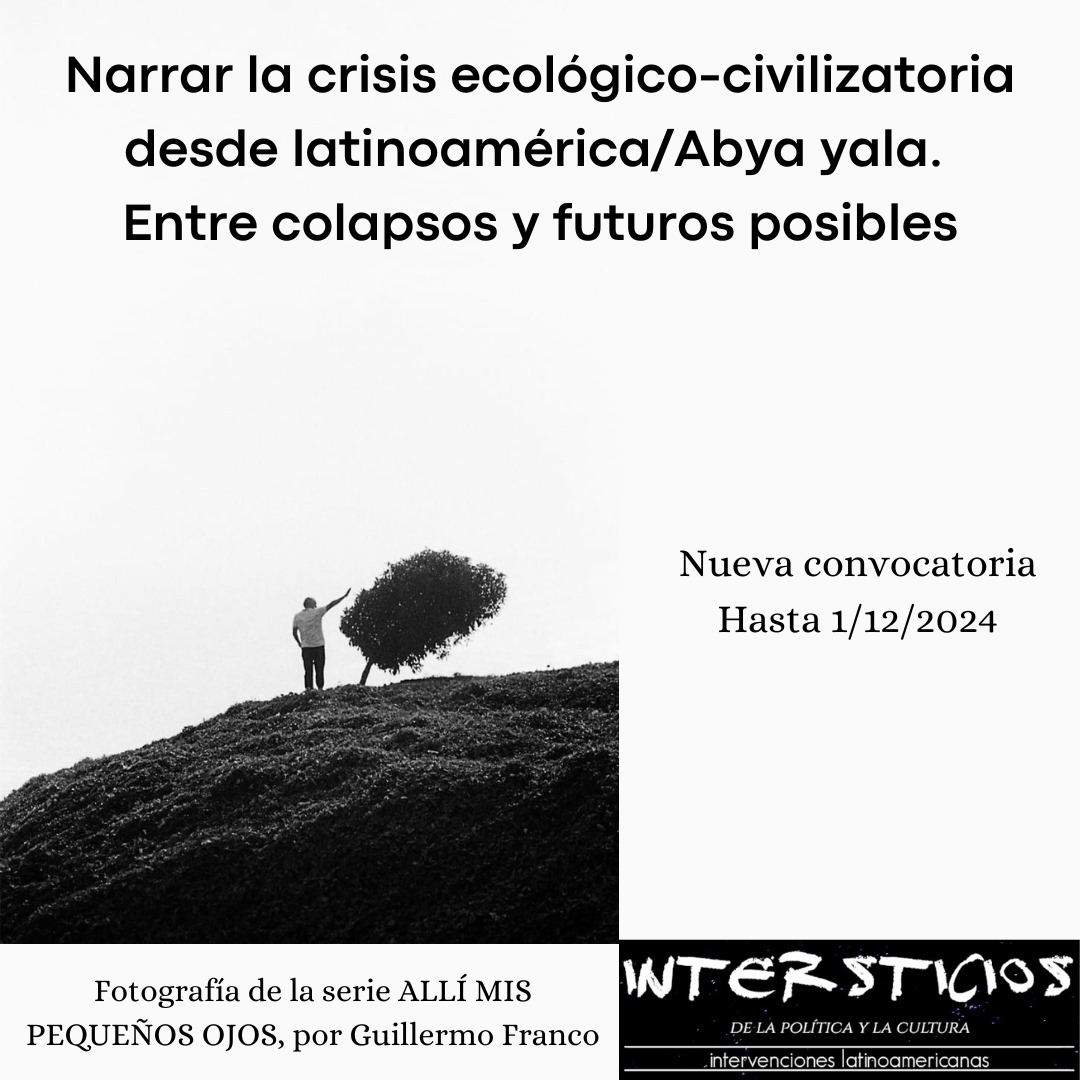Call for pappers

Invitation to publish in the dossier: Narrating the ecological-civilizational crisis from Latin America/Abya Yala. Between collapses and possible futures
(Until 28/02/2025)
For several decades now, the field of Political Ecology has been constituting a fruitful space for research and debate on the persistent coloniality of nature in Latin America (Escobar, 2000; Leff, 2003; Alimonda, 2011). From a transdisciplinary and amphibious approach, it has managed to incorporate the ecological debate into the field of humanities and social sciences, updating frameworks and opening new approaches to the heterogeneity and socio-political complexity of Latin American territories.
We thus arrive at a present, in this 21st century, in which the ecological-civilizational crisis is being accelerated in the form of pandemics and proliferation of new zoonoses, extreme climatic phenomena and collapses of urban-modern habitability, among other manifestations. What frameworks do we have to understand it? What concepts, categories, perspectives can we scrutinize to account for the complexity of this time? What are some of the singularities and persistencies of this time in which, according to Chakrabarty (2009), the distinction between natural history and social history collapses?
In this framework, we wonder about the contributions of the broad tradition of Latin American thought to the ecological-political field that allow us to reflect and problematize this picture in a situated manner. This is how we understand the threads and plots that connect political ecology to environmental thought (Maya, 1995; Noguera de Echeverri, 2004), political ontology (De la Cadena, Blaser, 2018; Escobar, 2012), Amerindian perspectivism (Viveiros de Castro, 2013), Latin American/liberation philosophy (Kusch, 1976; Dussel, 1977) or the politics of communality (Gutiérrez Aguilar, 2008; Martínez Luna, 2010), just to give some references. These perspectives allow us to search for geo-epistemic clues to approach this present crisis from the perspective of Our America. In the face of the analytical limits and anachronistic proposals that still proliferate from modern rationality and all its load of de-development, the imaginaries of the end of the world, the ideas around collapse, the notions of future and possible transitions deserve to be problematized and narrated from an eco-political key deeply rooted in the soil of Abya Yala.
In this line, under the general framework of the ecological-civilizational crisis, we invite you to participate with articles that contribute to value and nurture this fertile field of Latin American debate from both the review and updating of classic authors and categories, as well as the reflection on new epistemic-political proposals.
Special topics of interest:
- Disputes around common goods and alternatives to development.
- Academic interventions on socio-territorial problems and conflicts.
Senses of collapse from Latin America. From the local to the global. From the Conquest to the present.
- Imaginaries of the future in the face of the crisis: what narratives are being constructed in this part of the world?
- Debates about the Anthropocene/Capitalocene/afines.
- Reflections and theoretical inquiries about the relationship between nature(s), politics(s) and society(ies).
- Contributions from Latin American environmental thought, philosophy and environmental history.
Guest editors:
Leonardo Rossi (IRES-CONICET) & Matías Borrastero (CIECS-CONICET-UNC)
Bibliographical references (mentioned in the justification):
Alimonda, H. (2011). La colonialidad de la naturaleza. Una aproximación a la Ecología Política Latinoamericana (pp. 21-58). En Alimonda, H. (coord.) (2011), La Naturaleza colonizada. Ecología política y minería en América Latina, CLACSO: Buenos Aires.
Chakrabarty, D. (2009), The Climate of History: Four Theses, en Critical Inquiry, Vol. 35, No. 2, pp. 197-222: Chicago.
De la Cadena, M.; Blaser, M. (eds.) (2018), A world of many worlds, Duke University Press: Durham & London;
Dussel, E. (1977), Filosofía de la liberación. Edicol: México.
Escobar, A. (2000), La naturaleza del lugar y el lugar de la naturaleza: ¿globalización o posdesarrollo?, en Lander, E. (comp.) (2000), La colonialidad del saber: eurocentrismo y ciencias sociales. Perspectivas latinoamericanas, Ediciones CICCUS/CLACSO: Buenos Aires.
Escobar, A. (2012), Cultura y diferencia: la ontología política del campo de cultura y desarrollo, en Walekeru. Revista de Investigación en Cultura y Desarrollo, Nro. 2, pp. 7-17.
Gutiérrez Aguilar, R. (2008). Los ritmos del Pachakuti Movilización y levantamiento popular-indígena en Bolivia (2000-2005). Tinta Limón: Buenos Aires.
Kusch, R. (1976), Geocultura del hombre americano, Ediciones Fernando García Cambeiro: Buenos Aires.
Leff, E. (2003), Ecología Política en América Latina: un campo en construcción. En Sociedade e Estado, v. 18, n. 1/2, p. 17-40: Brasília.
Martínez Luna, J. (2010), Eso que llaman comunalidad, Consejo Nacional para la Cultura y las Artes: Oaxaca.
Maya, A. Á. (1995). La fragilidad ambiental de la cultura, Universidad Nacional de Colombia - Instituto de Estudios Ambientales: Bogotá.
Noguera de Echeverri, A. P. (2004), El reencantamiento del mundo. Instituto de Estudios Ambientales (IDEA): Manizales.
Viveiros de Castro, E. (2013), La mirada del jaguar. Introducción al perspectivismo amerindio. Entrevistas. Tinta Limón: Buenos Aires.










